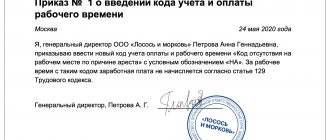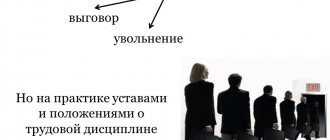Fulfillment of official duties is the responsibility of the employee
When applying for a job, the employee agrees to perform the work for which he was invited and understands that he will be responsible for failure to fulfill official duties. Before concluding an employment contract, he gets acquainted with his job description, internal labor regulations and other local acts relating to the performance of his labor function (Article 68 of the Labor Code of the Russian Federation), and signs that he has studied the documents and agrees with them.
The job description must detail his responsibilities at the workplace, the level of responsibility and the subordination structure. Correctly drawn up instructions can prevent many problems for the HR department in the future. Therefore, the drafting of this document must be approached very responsibly and the responsibilities must be listed in as much detail as possible, as in the fragment of the instructions for the cargo acceptor.
Where are the employee’s duties and the need to fulfill them stated?
According to Art. 57 of the Labor Code of the Russian Federation, the employer is obliged to specify in the employment contract the employee’s labor function (work according to the position in accordance with the staffing table, profession, specialty indicating qualifications, the specific type of work entrusted to the hired specialist). But if the employment contract contains an indication that the employee’s functionality is defined in the job description, then it is not required to duplicate its content in the employment contract regarding the range of job responsibilities. A job description is a LNA that specifies the functions of an employee. The specialist signs it when applying for a job (Article 68 of the Labor Code of the Russian Federation). Having read the document, the employee understands what he faces if they are performed poorly.
Common Disorders
A complete list of violations that may result in disciplinary measures up to and including dismissal are listed in Art. 81 Labor Code of the Russian Federation. Let us highlight the main cases that occur in practice:
- improper performance of job duties due to the absence of an employee, that is, absenteeism: the employee did not go to work or left his workplace for more than 4 hours in a row (clause 5 of Article 81 of the Labor Code of the Russian Federation);
- systematic lateness to work (clause 6 of article 81 of the Labor Code of the Russian Federation);
- being at the workplace, on the territory of the organization under the influence of alcohol, drugs or other intoxication (clause 6 of article 81 of the Labor Code of the Russian Federation);
- refusal to fulfill one’s duties without a good reason (clause 5 of Article 81 of the Labor Code of the Russian Federation);
- violation of labor protection requirements resulting in an accident or death at work (Articles 219 – 231 of the Labor Code of the Russian Federation);
- inconsistency of the employee with the position held (clause 3 of Article 81 of the Labor Code of the Russian Federation).
Ministry of Labor and Social Protection on disciplinary liability
The Ministry of Labor and Social Protection, the Federal Social Protection Fund, with the organizational support of YurSpectr LLC, held the IV Practical Conference “Social and Labor Relations: Legal and Accounting Aspects.”
With the report “ Disciplinary responsibility: misconduct or not, how to attract correctly? Tatiana Valeryevna Rakhubo , consultant of the labor relations department of the main legal department of the Ministry of Labor and Social Protection, spoke She also answered questions received from conference participants.
Legal regulation
The topic of disciplinary responsibility does not lose its relevance. But at the same time, it is necessary to understand that the employer, when bringing an employee to disciplinary liability, must comply with all labor legislation regulations governing this issue in order to avoid mistakes.
In this regard, the employer must: - remember that bringing an employee to disciplinary liability is possible only if there is a confirmed fact that the employee has committed a disciplinary offense ; — comply with all legal requirements for the procedure for bringing an employee to disciplinary liability .
The scope of disciplinary liability is regulated by : - Chapter 14 of the Labor Code; — Decree No. 5 of December 15, 2014; - Resolution No. 4 dated June 28, 2012, which is directly devoted to issues related to the practice of applying legislation on labor discipline; - Resolution No. 2 of March 29, 2001, which also addresses issues of labor discipline.
Note: In relation to certain categories of employees, such as civil servants, prosecutors, customs officials, etc., separate rules are applied that are provided for by the charters and regulations on discipline (see, for example, the Disciplinary Charter of the Customs Authorities of the Republic of Belarus, the Disciplinary Charter financial investigation bodies of the State Control Committee).
Labor discipline
The basis for preventing employees from committing disciplinary offenses is to ensure that the employer ensures proper labor discipline . Labor discipline is a concept that includes two components <*>:
1) obedience to the established labor regulations is obligatory for all employees;
2) proper performance of their duties by all employees.
Labor regulations are a system of norms regulating the behavior of employees during the performance of their duties, defining their rights and obligations and being mandatory. The sources of such norms are the legal regulations developed and adopted (approved) by the employer in the manner prescribed by law.
The work schedule for employees is determined by the legal regulations listed in Part 1 of Art. 194 TK. These include: - PVTR, which must be approved in each organization <*>. When hiring employees, they must be familiarized with them. Let us note that the employee places a note on familiarization in the PVTR itself , and not in the employment order; — job descriptions and work instructions for employees. Each employee must be familiar with his job description. Otherwise, the possibility of bringing him to disciplinary liability for failure to fulfill his duties is negligible, since it is considered that the scope of the employee’s duties is not determined by the employer.
Thus, the employer ensures labor discipline if all its employees obey the established labor regulations and properly perform their duties.
Note! LNLA regulating labor regulations cannot worsen the situation of workers in comparison with the Labor Code and other acts of legislation regulating relevant relations in the social and labor sphere <*>.
What is a disciplinary offense
The basis for bringing an employee to disciplinary liability is a disciplinary offense . It is understood as an unlawful, culpable failure or improper performance by an employee of his labor duties, for which disciplinary liability occurs <*>. An employee’s action (inaction) is a disciplinary offense if it simultaneously meets the following criteria :
Criterion 1. The action (inaction) of an employee constitutes a failure to fulfill or improper performance of his labor duties . It may be expressed in violation of <*>: - legal requirements; — PVTR; — responsibilities under the employment agreement (contract); — job descriptions; - regulations, orders (instructions) of the employer, etc.
Thus, in fact, non-fulfillment or improper performance by an employee of his labor duties is a violation of labor discipline, including disobedience to established labor regulations , since obedience to labor regulations is the responsibility of any employee <*>.
Criterion 2. The employee’s action (inaction) is illegal . The behavior of an employee in which he does not perform or does not properly fulfill the labor duties assigned to him is recognized as unlawful <*>.
When assessing the illegality of an employee’s act, expressed in his failure to perform or improper performance of his labor duties, it should be taken into account that the scope of the employee’s labor responsibilities must be determined in accordance with the law. In other words, as noted above, the employee must be familiarized with his job responsibilities in writing .
Example Bringing disciplinary action against an employee for performing functions that are not part of his job duties is unlawful.
Criterion 3 . The action (inaction) of the employee is guilty . An employee’s guilt in committing an unlawful act can be expressed in the form of both intent and negligence <*>.
Disciplinary offenses , in particular, include <*>: - absence of an employee from work without a good reason; — being, without good reason, not at one’s workplace, but in other premises of the organization; — early leaving work; - refusal to go on a business trip without good reason; — absenteeism from work on weekends and holidays, if the employee is involved in work legally; - refusal or evasion without good reason from undergoing medical examinations in accordance with the established procedure during working hours by employees of certain categories <*>; — refusal to instruct, train and test knowledge on labor protection issues <*>.
Note! If an employee has committed any of the listed acts, then this can be classified as a disciplinary offense.
Question: What is evidence of a disciplinary offense? Answer: Evidence of a disciplinary offense may include <*>: - memos; — acts of violations, drawn up in accordance with the established procedure; - materials of inspections and audits carried out by higher-level organizations, as well as government agencies. Alcohol, drug or toxic intoxication can be confirmed by a medical report and other types of evidence, including an act, testimony, which must be assessed by the court <*>. Other material objects are also evidence of a disciplinary offense if they contain information confirming the very fact of such an act. These include the same memos. If we talk about being late for work, absenteeism, etc., then this could be, for example, data from the electronic access system available in the organization.
What is not a disciplinary offense?
The legislation contains examples of acts that are not disciplinary offenses . Thus, refusal to perform <*> is not a violation of labor discipline and does not entail the application of disciplinary measures:
1) work that is not part of the employee’s job responsibilities . This is due to the fact that the employer does not have the right to require the employee to perform work not stipulated by the employment contract, except for cases provided for by legislative acts <*>;
2) work, the performance of which is contraindicated for health reasons . If there is a ban on performing some work, which is confirmed by the documents of the VKK or MREC, then the employee’s refusal to perform such work will be lawful;
3) public order . For refusal to perform duties during public events, the employer does not have the right to bring the employee to disciplinary liability, since their implementation is not related to work activity.
Note! Failure by an employee to fulfill his labor duties for reasons beyond his control cannot be considered a disciplinary offense <*>.
before the employee was hired or transferred to the appropriate position (specialty, profession) cannot be considered as a disciplinary offense
Example An employee was hired as a chief accountant at the beginning of 2021. The tax authorities are conducting an audit for 2015 - 2021. The employer does not have the right to bring the current chief accountant to disciplinary liability for violations committed during these periods.
It should be noted that the relations of the parties to the employment contract in the field of disciplinary liability are labor relations . In this regard, one of the conditions for disciplinary liability is the existence of an employment relationship between the employee and the employer in the following cases: - at the time of the commission of a disciplinary offense; — the moment of application of the disciplinary measure; — the period of time between the specified moments.
Note! A dismissed employee cannot be brought to disciplinary liability regardless of whether the disciplinary offense was discovered before or after the dismissal.
Ways to influence violators
Based on Art. 192 of the Labor Code, an employer may impose punishment for improper performance of official duties in the form of:
- comments;
- reprimand;
- dismissals.
The Labor Code does not provide for fines for employees for the offenses they have committed, that is, financial punishment for failure to fulfill official duties. In case of causing material damage to the employer, in accordance with Ch. 39 of the Labor Code of the Russian Federation, the employee will be obliged to compensate for the damage in whole or in part.
When you can't punish
It is impossible to punish an employee for failure to fulfill official duties if he has a good reason, which means there is no guilt. For example, neighbors flooded, the elevator broke down, a child got sick, the employer himself did not take the necessary measures to preserve his property, and it was stolen, but not through the fault of the employee, etc. It is also illegal to apply penalties in the following cases:
- refusal to work that poses a threat to life and health (Article 220 of the Labor Code of the Russian Federation);
- participation in a legal strike of workers (Articles 413 – 414 of the Labor Code of the Russian Federation);
- refusal to perform duties not specified in the instructions (Article 56 of the Labor Code of the Russian Federation).
Punishment procedure
In order to hold a guilty employee accountable by applying a penalty to him, it is necessary to draw up the documents correctly.
The registration procedure is as follows:
- We record the offense (act or memo).
- We request explanations (the employee has two working days to provide explanations).
- If there is no valid reason, we issue an order to impose a disciplinary sanction.
Sample act
Sample order for disciplinary action
Let's look at two common violations: absenteeism and failure to fulfill one's official duties.
Absenteeism
When it comes to absenteeism or absence from work, the employer’s actions will be as follows:
- It is indicated on the working time sheet.
- For each day of absence from work, an absence from work report is drawn up.
- A request is presented asking you to appear and give an explanation for your absence. If the employee returns to work the next day, the request is delivered personally; if the employee continues to be absent, the document is sent by registered mail with notification to the employee’s registered address.
- Management then decides whether the reason is valid. If the reason is justified, the procedure for applying punishment is terminated.
- When the reason is considered unjustifiable, an order is issued to impose disciplinary action.
To ensure that the likelihood of challenging the dismissal in court is small, the employer first of all punishes the employee for failure to fulfill official duties in the form of a reprimand.
The next violation will result in a reprimand. And only after the first two punishments have been applied, the employer dismisses the employee.
Failure to fulfill duties
When it comes to inconsistency with the position held or evasion of official duties is detected, the following steps are taken:
- The manager gives the employee a task in writing.
- It indicates the deadline for completion.
- If the task was not completed or done incorrectly, a memo is written addressed to the manager.
- The employee is asked to provide written explanations.
- An order to impose a penalty is issued.
If an explanation is not provided, this does not prevent the application of disciplinary action.
Deadlines
One disciplinary sanction can be applied for one offense. The period when a disciplinary sanction can be applied is 1 month from the date of discovery of the misconduct. This does not include employee vacation or sick time.
In ordinary cases, it is impossible to punish an employee after 6 months have passed since the commission of the offense. But if, during an audit or financial and economic inspection, flaws in accounting were identified, the time frame is extended to 2 years.
Employee disciplinary liability
The employee signed an employment contract, which means he agreed with the job responsibilities, daily routine and weekend schedule. This follows from Art. 21 of the Labor Code of the Russian Federation.
What is disciplinary liability for?
In general, the employee’s responsibilities are specified in the employment contract. More specifically, in the job description. It is valid if there is a reference in the contract.
According to the employment contract, the person was hired as a bartender.
The job description states that the bartender serves customers, brews espresso, is responsible for the cash register, and washes dishes.
The work and rest regime is specified in the employment contract or internal labor regulations.
If an employee violates official duties or work regulations, he commits a disciplinary offense - Art. 192 Labor Code of the Russian Federation.
Disciplinary sanctions - how to punish
There are three disciplinary sanctions for misconduct:
- remark;
- reprimand;
- dismissal.
They choose only one punishment and look at the severity of the offense.
Dismissal is the most severe penalty. Dismissal is allowed for absenteeism, alcohol and drugs in the workplace, disclosure of trade secrets, theft and loss of trust in working with money. All this is a “one-time gross violation” of Art. 81 Labor Code of the Russian Federation.
A reprimand is a less severe penalty, a reprimand is the mildest. There are no criteria or specific violations, but it is better to focus on the consequences.
The seller is impolite with the client - a remark is enough.
The client was offended by the rudeness and wrote a review on Google Map - a reprimand suggests itself.
If more than two comments and reprimands have accumulated, you can be fired for “repeated failure to fulfill duties” under Art. 81 Labor Code of the Russian Federation. Penalties accumulate for a year, then are extinguished, as if the offense had not occurred - Art. 194 Labor Code of the Russian Federation.
There is no fine for the employee among the penalties. If the word “fine” appears in your internal papers or simply in words, stop. This is a violation of the law, and you face punishment under Art. 5.27 Code of Administrative Offenses of the Russian Federation from the labor inspectorate. Employees cannot be fined.
How to impose disciplinary action
The strict order under Art. is important here. 193 Labor Code of the Russian Federation. Otherwise, the employee will challenge the penalty, return to work and receive compensation.
The procedure is like this:
- Record the offense. The employer draws up an act or memo. They write there on what day and time the employee was late or did not serve the client.
- Ask the employee for a written explanation. The request is submitted against signature. If the employee is at home, send it by letter with a list of the attachments. They wait two working days for an explanation, then they issue an act of refusal.
- Issue an order imposing a disciplinary sanction.
The order is issued no later than one month from the date of discovery of the offense and six months from the date of commission. And when the offense is related to money and was revealed during an audit or inventory - no later than two years after the commission. The day of detection - when the employee’s immediate supervisor learned about the misconduct, and this is not necessarily the owner of the business - clause 34 of the Resolution of the Plenum of the Armed Forces of the Russian Federation dated March 17, 2004 No. 2.The bartender took money from the cash register using the R-Keeper card - the day the offense was committed. Later, the manager saw this on a CCTV camera - the day the misconduct was discovered - case No. 33-48124/2016.
The employee's sick leave and vacation days are not counted towards the monthly period.
- Familiarize the employee with the order.
The order is presented against signature within three days from the date of publication. If a person ignores the order, they call witnesses and write a statement of refusal.
Timing is important. An order that is even a day late is considered a violation of procedure. Lawyers will advise the employee on this, and the court will reinstate him at work. Therefore, do not delay with the order, introduce them quickly and do not fire them right on time.
You can also issue a reprimand and dismissal after a statement of your own free will, when the employee has worked for two weeks. Labor discipline was not abolished at this time. This is stated in paragraph 33 of the Resolution of the Plenum of the Armed Forces of the Russian Federation dated March 17, 2004 No. 2.
What to pay an employee upon dismissal
An employee dismissed under this article is not entitled to severance pay. They only pay arrears of wages and compensation for vacations that were not taken.






